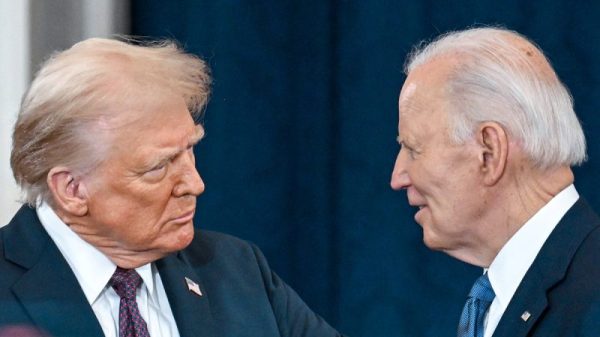GOP presidential candidate Nikki Haley said Wednesday that she agreed with the Alabama Supreme Court’s ruling that frozen embryos are people, but she did not directly address the ruling’s finding that clinics can be sued for disposing embryos.
When asked by NBC News whether she agreed with the court’s conclusion that embryos created through in vitro fertilization are considered children and should be offered those same protections, Haley said, “Embryos, to me, are babies.”
“I mean, I had artificial insemination. That’s how I had my son,” she said. “… One thing is to have to save sperm or to save eggs. But when you talk about an embryo you are talking about, to me, that’s a life.”
Alabama’s first-of-its-kind ruling came in response to a case looking at whether a patient who mistakenly dropped and destroyed another couple’s frozen embryos could be held liable in a wrongful-death lawsuit.
The decision has outraged medical organizations and reproductive rights groups, which say it imperils in vitro fertilization and relies on an unscientific definition of personhood. Hundreds of thousands of American patients rely on IVF and similar treatments each year.
The American College of Obstetricians and Gynecologists said in a statement that the decision “reflects a dangerous insertion of individual ideological beliefs into policy making” about medical care.
Haley, a former U.N. ambassador and South Carolina governor, is trailing Donald Trump in polling in her home state of South Carolina and said she has no plans to bow out of the presidential race after Saturday’s GOP primary there. Over the course of her presidential campaign, she has been vague on how she would handle abortion while in office. In an interview with CBS last month, she described herself as antiabortion but said “I don’t judge anyone” for supporting access to the procedure.
When Haley was pressed by NBC News on Wednesday about whether she had concerns about the implications of the Alabama ruling for people seeking IVF treatment, she said: “I think that we have to have those conversations. That’s incredibly personal. It’s incredibly sensitive. And I think that’s the conversation the doctor needs to have with the patient.”
Haley wouldn’t say whether she thought potential legislation protecting frozen embryos as unborn lives would have a chilling effect on families seeking fertility treatment. “We need to look at the details,” she said.
In a statement, the American Society for Reproductive Medicine called the decision “medically and scientifically unfounded,” adding, “No health care provider will be willing to provide treatments if those treatments may lead to civil or criminal charges.”
IVF involves transferring a fertilized egg, or embryo, into a patient’s uterus. It is more expensive and invasive than artificial insemination and is recommended in some cases, such as to couples dealing with conditions such as blocked fallopian tubes, severe male infertility, endometriosis or multiple miscarriages — and to those for whom artificial insemination did not work, according to the Cleveland Clinic.
In IVF treatment, several eggs may be fertilized to ensure some are developing normally, while other viable embryos can be frozen for future use. Freezing embryos, Johns Hopkins Medicine explains, can also help preserve the possibility of future pregnancy for patients undergoing medical interventions that affect fertility.
GOP presidential candidate Nikki Haley said Wednesday that she agreed with the Alabama Supreme Court’s ruling that frozen embryos are people, but she did not directly address the ruling’s finding that clinics can be sued for disposing embryos.
When asked by NBC News whether she agreed with the court’s conclusion that embryos created through in vitro fertilization are considered children and should be offered those same protections, Haley said, “Embryos, to me, are babies.”
“I mean, I had artificial insemination. That’s how I had my son,” she said. “… One thing is to have to save sperm or to save eggs. But when you talk about an embryo you are talking about, to me, that’s a life.”
Alabama’s first-of-its-kind ruling came in response to a case looking at whether a patient who mistakenly dropped and destroyed another couple’s frozen embryos could be held liable in a wrongful-death lawsuit.
The decision has outraged medical organizations and reproductive rights groups, which say it imperils in vitro fertilization and relies on an unscientific definition of personhood. Hundreds of thousands of American patients rely on IVF and similar treatments each year.
The American College of Obstetricians and Gynecologists said in a statement that the decision “reflects a dangerous insertion of individual ideological beliefs into policy making” about medical care.
Haley, a former U.N. ambassador and South Carolina governor, is trailing Donald Trump in polling in her home state of South Carolina and said she has no plans to bow out of the presidential race after Saturday’s GOP primary there. Over the course of her presidential campaign, she has been vague on how she would handle abortion while in office. In an interview with CBS last month, she described herself as antiabortion but said “I don’t judge anyone” for supporting access to the procedure.
When Haley was pressed by NBC News on Wednesday about whether she had concerns about the implications of the Alabama ruling for people seeking IVF treatment, she said: “I think that we have to have those conversations. That’s incredibly personal. It’s incredibly sensitive. And I think that’s the conversation the doctor needs to have with the patient.”
Haley wouldn’t say whether she thought potential legislation protecting frozen embryos as unborn lives would have a chilling effect on families seeking fertility treatment. “We need to look at the details,” she said.
In a statement, the American Society for Reproductive Medicine called the decision “medically and scientifically unfounded,” adding, “No health care provider will be willing to provide treatments if those treatments may lead to civil or criminal charges.”
IVF involves transferring a fertilized egg, or embryo, into a patient’s uterus. It is more expensive and invasive than artificial insemination and is recommended in some cases, such as to couples dealing with conditions such as blocked fallopian tubes, severe male infertility, endometriosis or multiple miscarriages — and to those for whom artificial insemination did not work, according to the Cleveland Clinic.
In IVF treatment, several eggs may be fertilized to ensure some are developing normally, while other viable embryos can be frozen for future use. Freezing embryos, Johns Hopkins Medicine explains, can also help preserve the possibility of future pregnancy for patients undergoing medical interventions that affect fertility.





















